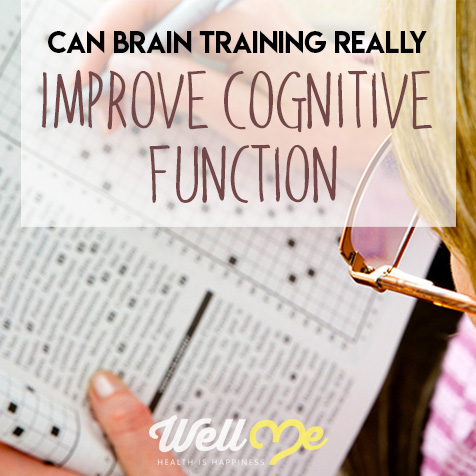With the popularity of brain training games and software peaking in the past 10 years, there is a serious question about whether these programs can really improve cognitive function. With Alzheimer’s disease and other degenerative brain diseases posing a serious threat to your health and mortality, it is a great idea to combat cognitive decline to improve longevity and quality of life. You’re going to age, that’s inevitable, but staying active both physically and mentally is a great way to keep yourself as independent and healthy as possible.
Brain training is simply the application of physical training principles to cognitive ability: these programs and games require the user to perform increasingly difficult mental challenges. There are a variety of different types of brain training exercise, with different mental skills being targeted. This article is going to look at whether brain training games and programs actually improve cognitive performance and long-term function.
Intelligence and Cognitive Function

We already know that brain training improves your ability to perform brain training tasks, but this isn’t the same as increasing intelligence or cognitive performance. The problem is figuring out what we’re trying to improve and what sort of improvements we can expect, outside of simply getting better at performing brain training tasks.
If you’re looking to increase your intelligence, brain training programs will not help. Intelligence is primarily measured in IQ, but IQ is abstracted from your ability in a wide variety of tasks, skills, and capabilities. IQ is a large-scale measure of your overall cognitive ability and it will not increase significantly from brain training, even if the individual skills can be improved.
Intelligence can be broken down into two main types of ability: crystallized intelligence (Gc) and fluid intelligence (Gf).[1] Fluid intelligence is your ability to deal with new or rapidly changing challenges you’ve never been confronted with before.
Crystallized intelligence, by contrast, is your ability to apply existing methods, structures, and strategies to fix novel problems. When we talk about increasing cognitive function, it is important to specify which of these ‘intelligences’ we are talking about, or any of the other mental abilities.
What Kind of Improvements Does the Research Suggest?
The research for brain training is a mixture of positive and negative results, with modest implications across a variety of different mental skills and capabilities. Cognitive functions such as short-term memory and processing speed are less stable and, as a result, it is in these areas that we see the greatest improvements in response to brain training.[2]
Special Populations: Huge Benefits Depend on Proper Timing

The most important development we see in response to brain training is protection against the onset of degenerative brain diseases such as Alzheimer’s (the 5th most common ‘natural’ cause of death in the United States) and dementia. Mental exercises like brain training are a great way to retain memory and keep the cognitive functions sharp, improving quality of life as you age.[3]
Brain training methodologies have also been shown to have positive effects in children, with children who used these programs and games showing a more positive self-concept.[4] This basically refers to the way that children think about themselves and their own abilities, which has been shown to have positive effects on future goal-setting and achievement.[5]
The problem with these two study results is that they discuss things you could have done, or things you should do, but they apply specifically to ‘special populations’. Children and the elderly are in parts of life that can be classed as “less stable”: children are still developing and positive stimulus can cause many changes, whereas the elderly are preserving functions rather than developing it. The real question is, what kind of effects can we expect for the average 35-year old adult?
Benefits for Everyone: Brain Training for the Masses

As mentioned above, the greatest effect is seen with the least stable forms of cognitive function. However, one study on the impact of brain training games on healthy adults found that they improved different cognitive domains, including attention and motor speed.[6]
Brain training may be a good choice for adults anyway, as most adults are likely to benefit from any form of cognitive training. IQ trajectories tend to show development into the 20s, after which the neural efficiency drops. This simply means that you become more efficient with your intelligence, but your natural ability to learn and improve is decreased.
Cultural factors, such as a decrease in time spent learning and challenging oneself, play a major role in this decline: it is beneficial for adults to perform any mentally-challenging activities, and brain training is often the most convenient method for achieving this.
Other Methods of Improving Cognitive Function

Are you unsatisfied with the ‘modest’ effects of brain training, and want more actionable advice on how to improve your cognitive function? A significant degree of intelligence is genetic, but you can improve your efficiency and move towards your natural limit in a number of ways, even if the effects are limited.[7]
First, be sure to eat a healthy diet and perform sufficient exercise. Diet has been shown to be a huge part of brain function, both in the development of the brain in children and the efficiency, health, and longevity of the adult brain.[8] This means that a diet high in key nutrients such as vitamin D, omega-3 fatty acids, and high-quality proteins, can boost your long-term IQ trajectory and keep the brain young. It’s also important to remember to eat your greens[9] as well as consume a variety of other nutrients (primarily the kinds found in plant foods such as vitamin and mineral rich microgreens).
Exercise has also been cited as one of the most important ways of keeping the brain young and healthy. You already know that exercise is amazing for your body, but it has an essential role in the development and maintenance of the brain and nervous system as well. Exercise is closely linked to brain plasticity: the ability of the brain to change and develop over time, especially in response to drastic changes in environment or neurological injury.[10]

Conclusion: Can Brain Training Really Improve Cognitive Function?
Looking at the issue with a bird’s-eye view, it is clear that there are some benefits worth considering. Brain training is great for the young and the elderly. While positive effects for the rest of us are more difficult to achieve, and less likely to occur, they do exist and can be achieved with relatively little effort.
This is the real question regarding brain training: ‘how much time and effort does it cost, compared to the possible benefits?’ We already know that the odds of improving important cognitive function through brain training are moderate, so you’re not going to become a genius overnight!
However, the effort required to reap the possible benefits of brain training is almost nothing. Effective brain training takes 5 to 15 minutes each day, with relatively interesting and enjoyable challenges. Of course, it can seem difficult to squeeze in the time to do so. But just consider the amount of time you spend in a day by watching television, YouTube videos, or any other unproductive pastime. Imagine the results if you instead dedicated a little of that time to brain training!
References
- [1] https://link.springer.com/article/10.3758/s13423-014-0699-x
- [2] http://jech.bmj.com/content/66/7/624.short
- [3] http://journals.plos.org/plosone/article?id=10.1371/journal.pone.0029676
- [4] http://onlinelibrary.wiley.com/doi/10.1111/j.1467-8535.2008.00918.x/full
- [5] https://psycnet.apa.org/record/2004-18908-004
- [6] https://www.ncbi.nlm.nih.gov/pmc/articles/PMC5930973/
- [7] http://journals.plos.org/plosone/article?id=10.1371/journal.pone.0024372
- [8] http://www.sciencedirect.com/science/article/pii/S0952327806001256
- [9] http://www.sciencedirect.com/science/article/pii/S1043276001005471
- [10] http://www.sciencedirect.com/science/article/pii/S0166223602021434








